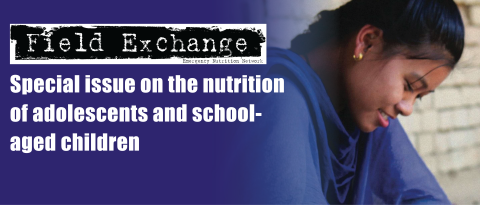Conducting formative research on adolescent nutrition: key considerations
By Akriti Singh, Abby Conrad and Lauren S. Blum
Akriti Singh is a Nutrition and Health Systems Advisor at USAID Advancing Nutrition.
Abby Conrad is a Learning Advisor at USAID Advancing Nutrition.
Lauren S. Blum is an Adjunct Professor at Tulane University and was a consultant with USAID Advancing Nutrition.
In September 2021, USAID Advancing Nutrition released guidance outlining the key considerations for designing and conducting formative research on nutrition (e.g., dietary practices, body image and influencing factors) with adolescents 10-19 years of age. The guidance provides background on adolescent nutrition and current research gaps. It also emphasises the role of formative research in designing and refining adolescent nutrition programmes which consider the unique determinants and drivers of nutrition behaviours during adolescence.
To develop the guidance, USAID Advancing Nutrition consulted 13 researchers and project implementers across Asia, Africa, the Middle East, North America and Australia. Their insights were supplemented with a desk review of approximately 20 formative research study reports and guidance documents.
The primary audience for this guidance is programme planners and implementers who aim to design and conduct formative nutrition research with adolescents in low- and middle-income countries. The key considerations are described under the following research steps: 1) determining formative research objectives; 2) designing and conducting formative research; 3) considering ethics and confidentiality; 4) analysing data; and 5) disseminating and using findings. The guidance also presents participatory nutrition data collection methods appropriate for gathering information from adolescents as well as pointing users to other available literature to support high quality research efforts. Finally, an example is provided on how pre-testing social and behaviour change materials can be utilised when a project may not have the time or resources to conduct formative research.
Common lessons and best practices gathered from the consultations and desk review included 1) focus on key adolescent behaviours and their determinants or drivers; 2) collect data using qualitative, participatory methods; 3) engage adolescents in formative research; 4) tailor data collection to local adolescent social and gender norms; 5) address additional adolescent-specific ethical considerations; 6) involve data collectors and adolescents in data analysis and interpretation; and 7) use creative and innovative approaches to share findings with adolescents, communities and stakeholders.
These learnings have been incorporated into the guidance which is available at: https://www.advancingnutrition.org/resources/formative-research-guidance-adolescent-nutrition


